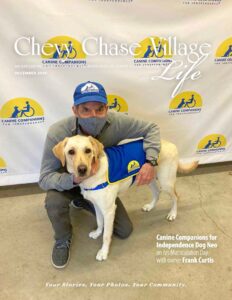
From Chevy Chase Village Life magazine
It’s been a year and a half since Chevy Chase Village Life magazine wrote about Neo, the Canine Companions for Independence dog being trained by Village residents Frank Curtis and Melissa Skolfield, and we thought it was high time we check in with his progress.
Canine Companions for Independence, which was founded in 1975, is a non-profit organization that enhances the lives of people with disabilities by providing highly-trained assistance dogs and a lifetime of support to ensure quality partnerships. The organization breeds all their own dogs in a facility out in California, then ships them to puppy raisers like Frank and Melissa across the country.
Neo (offical name Neo II) came to the couple from Canine Companions’ breeding facility in California via Long Island as an 8-week old puppy. He is a lab-retriever mix with a gentle, mellow temperament, and is great with other people and dogs, including his big brother Buddy, an 8-year-old black lab, but he is known to test Buddy’s patience by stealing his toys every now and then.
Neo was due to graduate from puppy training and return to the Canine Companions facility for further training in Long Island on August 1 this year, but COVID restrictions meant the facility was temporarily closed, so he instead got an extension of his time on Park Street. Neo left for Long Island on October 26. Sadly, continued COVID restrictions mean there will no longer be a traditional matriculation ceremony with other dogs when he arrives. The dogs will instead show up one by one and then train in small groups.
I stopped by Melissa’s and Frank’s house on a recent sunny October afternoon to find out how the last year and a half of training have been going for Neo, and what he can expect to happen over the course of the next few months.
The most critical time for socializing puppies is between three months and a year, and in that time Neo has learned how to give and receive affection and, most importantly, how to be around people and other dogs, including his Canine Companion friend Grommet, who entered professional training three months ago.
In the time Neo has lived with the couple, he has learned how to sit, lie down, rest his head in his owners’ lap and jump up on command, which is a useful skill for a dog who needs to be able to turn light switches on and off for his eventual owner, who may be in a wheelchair. He has also learned how to ride in an elevator and car, walk through a grocery store (Frank took Neo to Wholefoods), and has spent time at the beach, where he learned to deal with waves.
Neo has also learned how to be alone, which is important for service dogs, and to sit and stay still for long periods of time, which is necessary for canine companions who need to attend a school or go to the office with their eventual owners. The ultimate goal for puppy raiser raisers is to turn in an easy, low maintenance dog at the end of their stay, and Neo to fit that bill well.
Like any proud parents, Frank and Melissa have been delighted with Neo’s progress, although the couple was warned that no dog is perfect – not even Neo. He still has to learn to bark on command, although that is pretty common with Canine Companions dogs at this stage since they don’t know why they need to bark. More importantly, however, Neo has become a dog that loves to give and receive affection, and who likes new experiences and meeting new dogs and new people.
Because of the unexpected extension to his time on Park Street, Neo has even started learning a few bonus skills, such as getting a head start on picking up dropped objects like reading glasses and bringing them to people – a skill that requires a soft mouth. These skills are normally taught during the second round of training at the Canine Companions facility.
Both Melissa and Frank are excited for Neo to see if he is going to make it through the next stage of training and where he ends up. While it’s up to any eventual owner to decide if they will stay in touch with their dog’s puppy raisers, many do, and some puppy raisers continue to interact with the dogs they trained by assisting with grooming and nail-trimming if they live nearby – tasks that can otherwise sometimes be hard for those with disabilities.
Melissa has always pictured Neo with a child in elementary or middle school, as he loves children, and would be great at sitting in a classroom for 45 minutes. Indeed, before COVID restrictions came into place, Neo would go into Melissa’s office with her once a week and visit with her colleagues in their offices while he was there.
Only about half of the 800 puppies in the Canine Companions program end up making the cut as canine companions, but if for any reason Neo does not make it, it’s possible he will be sent back to Frank and Melissa. In that case, they hope to participate in Canine Companions’ pilot therapy dog program, which would enable Neo to make a difference in another way. Therapy dogs visit schools, colleges, hospitals, hospices, and even airports – anywhere people might be experiencing stress or anxiety and could use the soothing presence of a dog to help them feel calmer.
While Frank and Melissa will certainly miss Neo after he leaves them, Buddy, apparently, will be just fine (and may even appreciate the fact that Neo is no longer around to take his toys). As for whether they will volunteer to raise another puppy for Canine Companions for Independence in the future, they have decided to wait and see how they feel after Neo leaves. One thing is for certain: October 26 was a bittersweet day for all concerned, and we will miss seeing Neo in his smart yellow vest walking around the Village, even as we are excited for him as he embarks on the important next steps in his life as a service dog.
Chevy Chase Village Life is planning to stay in touch with Neo’s progress through Frank and Melissa as he continues on his training journey, but readers hoping to find out more about Canine Companions, or to make a donation in the meantime, are encouraged to check out their website at http://canine.org/.
